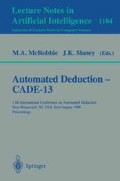Abstract
Tactics are encoded as verifiable meta-functions in a powerful programming logic with reflective capabilities. These formalized tactics are applied to specific problems by means of deductive reflection rules. The main advantage of this approach lies in the fact that meta-theoretic results, once proven, are used without further justification to construct proofs of object-level problems. As another consequence, new theorem-proving capabilities like decision procedures are added and tightly integrated with the basic formal tactics mechanism in a sound way.
Preview
Unable to display preview. Download preview PDF.
References
S.F. Allen, R.L. Constable, D.J. Howe, and W.E. Aitken. The Semantics of Reflected Proof. In Proc. 5th Annual IEEE Symposium on Logic in Computer Science, pages 95–105. IEEE CS Press, 1990.
H.P. Barendregt. The Lambda Calculus: Its Syntax and Semantics, volume 103 of Studies in Logic and The Foundations of Mathematics. North-Holland, revised edition edition, 1984.
D.A. Basin. Beyond Tactic Based Theorem Proving. In J. Kunze and H. Stoyan, editors, KI-94 Workshops: Extended Abstracts. Gesellschaft für Informatik e.V, 1994. 18. Deutsche Jahrestagung für Künstliche Intelligenz, Saarbrücken.
D.A. Basin and R.L. Constable. Metalogical Frameworks. Technical Report TR 91-1235, Department of Computer Science, Cornell University, September 1991.
R.S. Boyer and J.S. Moore. Metafunctions: Proving them Correct and Using them Efficiently as New Proof Procedures. In R.S. Boyer and J.S. Moore, editors, The Correctness Problem in Computer Science, chapter 3. Academic Press, 1981.
R.L. Constable, S.F. Allen, and H.M. Bromley et al. Implementing Mathematics with the Nuprl Proof Development System. Prentice-Hall, 1986.
T. Coquand and G. Huet. The Calculus of Constructions. Information and Computation, 76(2/3):95–120, 1988.
J.-Y. Girard, Y. Lafont, and P. Taylor. Proofs and Types, volume 7 of Cambridge Tracts in Theoretical Computer Science. Cambridge University Press, 1989.
M. J. Gordon, A. J. R. Milner, and C. P. Wadsworth. Edinburgh LCF: a Mechanized Logic of Computation, volume 78 of Lecture Notes in Computer Science. Springer-Verlag, Berlin, 1979.
M.J.C Gordon and T.F. Melham. Introduction to HOL: A Theorem Proving Environment for Higher-Order Logic. Cambridge University Press, 1993.
R. Harper, F. Honsell, and G. Plotkin. A Framework for Defining Logics. Journal of the Association for Computing Machinery, 40(1):143–184, January 1993.
D.J. Howe. Automating Reasoning in an Implementation of Constructive Type Theory. PhD thesis, Cornell University, 1988. Available as technical report TR 88-925 from the Department of Computer Science, Cornell University.
D.J. Howe. Reflecting the Semantics of Reflected Proof. In P. Aczel, H. Simmons, and S. Wainer, editors, Proof Theory, pages 227–250. Cambridge University Press, 1992.
T.B. Knoblock and R.L. Constable. Formalized Metareasoning in Type Theory. In Proceedings of LICS, pages 237–248. IEEE, 1986. Also available as technical report TR 86-742, Department of Computer Science, Cornell University.
G. Kreisel and A. Lévy. Reflection Principles and their Use for Establishing the Complexity of Axiomatic Systems. Zeitschrift für math. Logik und Grundlagen der Mathematik, Bd. 14:97–142, 1968.
J. Meseguer and M.G. Clavel. Axiomatizing reflective logics and languages. Submitted for publication, November 1995.
B. Nordström, K. Petersson, and J.M. Smith. Programming in Martin-Löf's Type Theory. Number 7 in International Series of Monographs on Computer Science. Oxford Science Publications, 1990.
S. Owre, J. Rushby, N. Shankar, and F. von Henke. Formal Verification for Fault-Tolerant Architectures: Prolegomena to the Design of PVS. IEEE Transactions on Software Engineering, 21(2):107–125, February 1995.
L.C. Paulson. Logic and Computation: Interactive Proof with Cambridge LCF. Number 2 in Cambride Tracts in Theoretical Computer Science. Cambridge University Press, 1987.
L.C. Paulson. Isabelle: A Generic Theorem Prover. Number 828 in Lecture Notes in Computer Science. Springer-Verlag, 1994.
E. Ritter. Cagegorical Abstract Machines for Higher-Order Typed λ-Calculi. Theoretical Computer Science, 136:125–162, 1994.
H. Rueß. Formal Meta-Programming in the Calculus of Constructions. PhD thesis, Universität Ulm, 1995.
C. Smorynski. Self-Reference and Modal Logic. Springer-Verlag, 1985.
F. W. von Henke. An Algebraic Approach to Data Types, Program Verification, and Program Synthesis. In Mathematical Foundations of Computer Science, Proceedings. Springer-Verlag Lecture Notes in Computer Science 45, 1976.
F.W. von Henke, A. Dold, H. Rueß, D. Schwier, and M. Strecker. Construction and deduction methods for the formal development of software. In M. Broy and S. Jähnichen, editors, KORSO, Correct Software by Formal Methods, number 1009 in LNCS. Springer-Verlag, Lecture Notes in Computer Science, 1995.
R. W. Weyhrauch. Prolegomena to a Theory of Mechanized Formal Reasoning. Artificial Intelligence, 13(1):133–170, 1980.
Author information
Authors and Affiliations
Editor information
Rights and permissions
Copyright information
© 1996 Springer-Verlag Berlin Heidelberg
About this paper
Cite this paper
Rueß, H. (1996). Reflection of formal tactics in a deductive reflection framework. In: McRobbie, M.A., Slaney, J.K. (eds) Automated Deduction — Cade-13. CADE 1996. Lecture Notes in Computer Science, vol 1104. Springer, Berlin, Heidelberg. https://doi.org/10.1007/3-540-61511-3_118
Download citation
DOI: https://doi.org/10.1007/3-540-61511-3_118
Published:
Publisher Name: Springer, Berlin, Heidelberg
Print ISBN: 978-3-540-61511-8
Online ISBN: 978-3-540-68687-3
eBook Packages: Springer Book Archive

